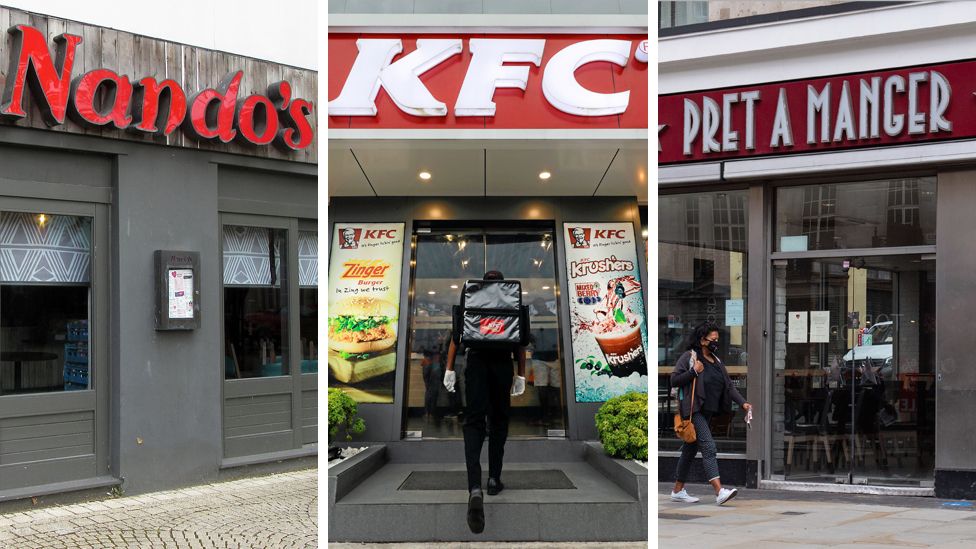KFC, Nando's and Pret lower prices after VAT cut
- Published
- comments

A £4bn cut in VAT has come into force, allowing firms in the food, drink and hospitality sectors to slash prices.
Nando's, Pret A Manger and McDonald's are among firms to promise reductions after the chancellor ordered a temporary VAT cut from 20% to 5%.
The Treasury estimates households could save £160 a year on average, but not all firms will pass on the benefit.
Many companies are expected to use the windfall to shore up finances hit by the lockdown, rather than cut prices.
The VAT reduction will stay until 12 January next year, Chancellor Rishi Sunak announced last week. It was part of a package of measures to help firms recover and get consumers spending.
VAT - Value Added Tax - is paid on everyday goods and services, but the tax is usually included in the price most consumers see.
Several restaurants and food-to-go chains have announced price cuts:
- Nando's said it would pass on "100% of the benefits" from the tax cut to its customers, reducing the price of a quarter chicken by 55p
- Pret A Manger will cut the price of a takeaway latte by 35p to £2.40 from Wednesday, while the price of hot food will be cut from Friday
- KFC is reducing the price of sharing buckets by £1 and slashing the cost of certain "fan favourites" by 50p
- McDonald's is recommending that its franchisees cut prices on an array of products, including the Big Mac, Quarter Pounder and coffee
- Pub chain Wetherspoon is to reduce prices on meals, coffee and soft drinks, and reduce prices on popular beers
- Starbucks will pass on the full 15% discount on coffee served in company-operated stores. Other shops and venues with Starbucks licences will be left to pass on whatever reductions suit their business.
What is VAT?
Value Added Tax, or VAT, is the tax you have to pay when you buy goods or services.
The standard rate of VAT in the UK is 20%, with about half the items households spend money on subject to this rate.
There is a reduced rate of 5% which applies to some things such as children's car seats and home energy.
When you see a price for something in a shop, any VAT will already have been added.
There are also various items for which you do not have to pay any VAT, such as most supermarket food, children's clothing, newspapers and magazines.
It is clear that many businesses will not be passing on the reduction. Malcolm Bell, chief executive of Visit Cornwell, said the chancellor's move was to support business, not help holidaymakers.
He said some firms had reported tourists calling them to ask for 15% off their holiday booking. "My message to customers is this is to help the businesses, not to reduce the cost of their holiday. It is only a temporary relaxation up to January."
Many attractions such as museums, parks and zoos, might also not pass on the reduction.
Bernard Donoghue, director of the Association of Leading Visitor Attractions (Alva), said he expected the VAT cut would go towards helping venues "repair their finances as opposed to being passed on to customers".
Alva members were seeing a spike in demand after three months of lockdown, with attractions that offer pre-booked visits "vastly oversubscribed", he said.
Pub chain Wetherspoon said it would use the tax break to help fund lower prices on some of its most popular beers.
However, this move drew criticism from Tom Stainer, chief executive of the Campaign for Real Ale (Camra), and James Calder, chief executive of the Society for Independent Brewers (Siba).
"Like all pubs, Wetherspoon will not be able to benefit from a VAT reduction on beer sales and it is disappointing to see them potentially mislead customers into believing cheaper beer prices are as a direct result of the chancellor's measures," he said.
Wetherspoon has produced promotional posters to advertise food price cuts, including one called Sunak's Specials and another called Dishi Rishi.
Its chairman, Tim Martin, has campaigned for tax equality between pubs, restaurants and supermarkets for many years. He said: "Supermarkets pay no VAT on food sales and pubs pay 20%. Supermarkets pay about 2p per pint of business rates and pubs pay about 20p.
"A VAT reduction will help pubs and restaurants reverse this trend - creating more jobs, helping high streets and eventually generating more tax income for the government."
But he said that not every hospitality business would be able to reduce prices immediately.
"Some will need to retain the benefit of lower VAT just to stay in business. Others may need to invest in upgrading their premises.
"However, lower VAT and tax equality will eventually lead to lower prices, more employment, busier High Streets and more taxes for the government."
- Published24 September 2020
- Published8 July 2020